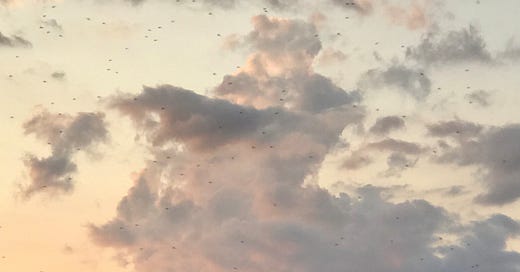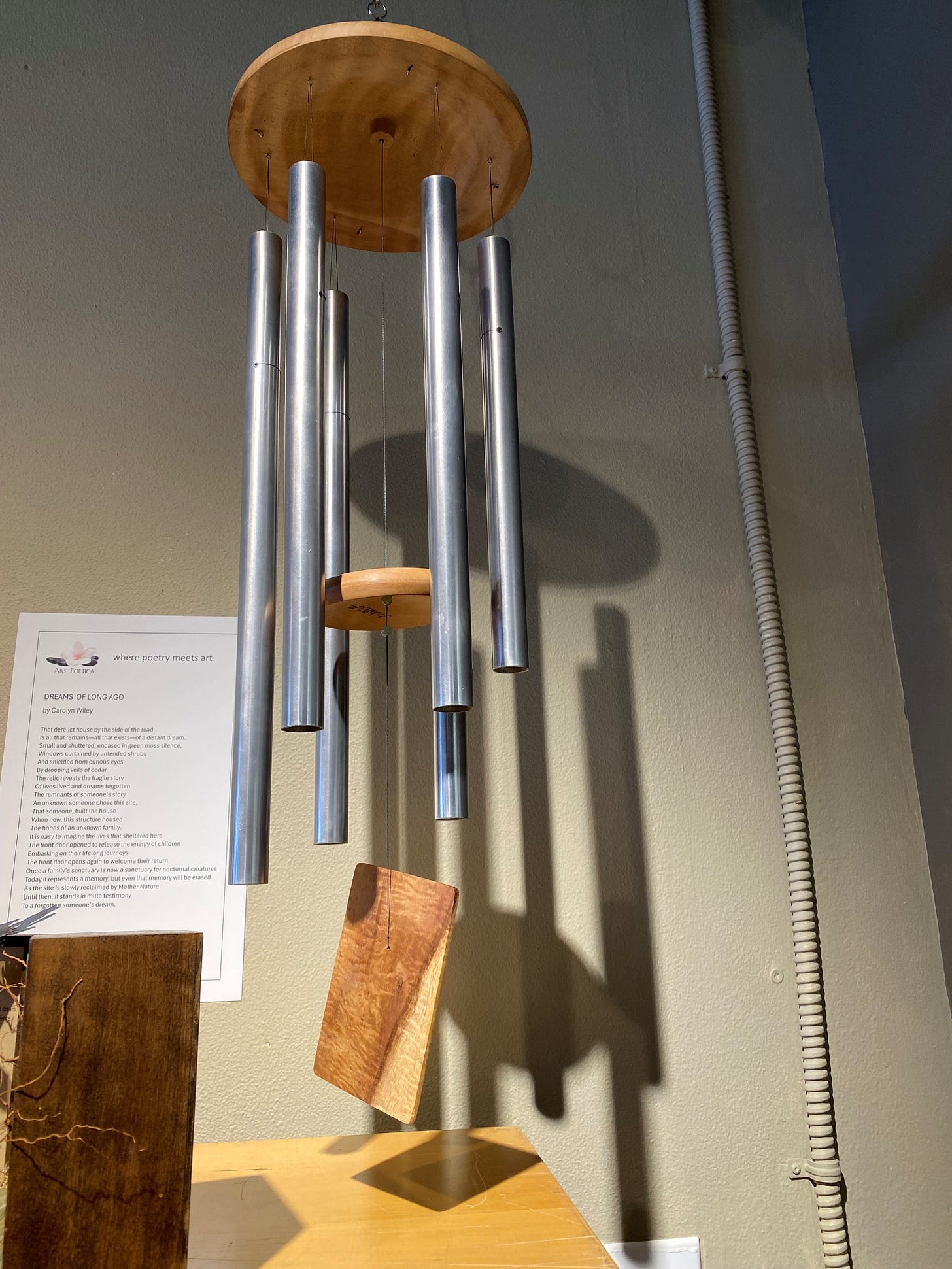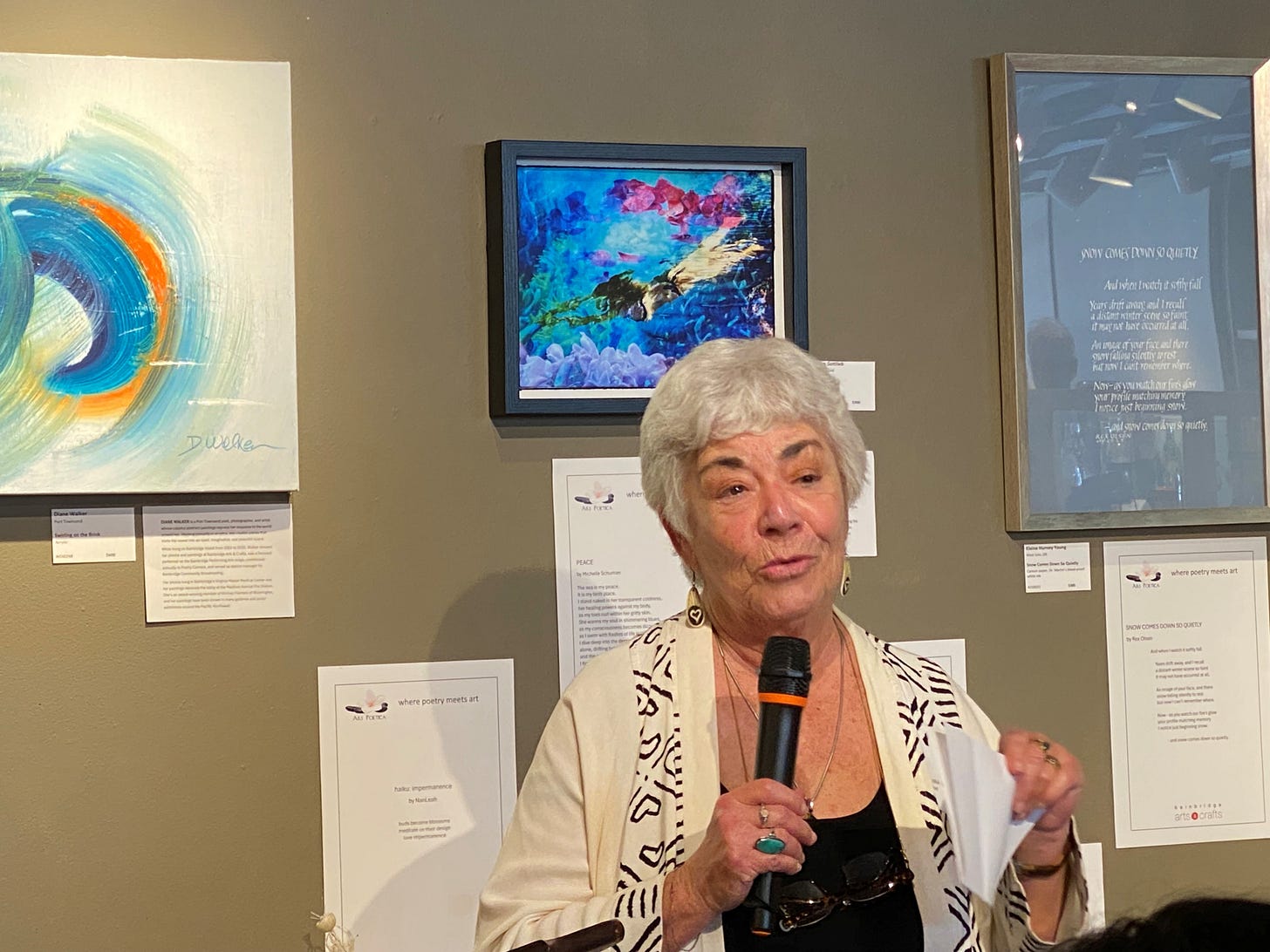It was 67 degrees outside, an unusually warm day for the Pacific Northwest for the date of April 5. Spring was definitely “in the air,” as the cliché goes.
I sat in a folding chair beside my husband at Bainbridge Island Arts and Crafts, an art store for local artists. People gathered to hear artists discuss their work, and poets read their poems, which inspired the artworks.
Outside, people walked, gazing into shops after a peaceful protest march had concluded. Inside, perhaps twenty-five or thirty people milled about, examining the artwork or standing and waiting for the “event” to begin, while another twenty-five or so sat down. On the walls in a corner of the store hung printed poems alongside created art objects. Women were dressed either casually or in artistic jackets and blouses, while men mostly wore jeans. A lot of people had white hair.
There was a slight tremor of excitement in the air, a spirit of creativity, a sense of aliveness, and an anticipation of what was to come.
I was curious. I had no idea how this would unfold. I had been informed about the opportunity about three months prior and had submitted three poems for consideration. Two of them were selected by artists from across Kitsap County to create artwork inspired by a poem. Before us lay various pieces of artwork—including paintings, wood lathe sculptures, glass sculptures, illustrations, and a wind chime.
A hush fell over the room as Tamarah, the poetry editor for Ars Poetica, began her introduction. I had no idea which art object was linked to my poem. I had nearly submitted my own artwork to accompany the poem- a photograph taken from the back dock of a cabin where we stayed on Isle Royale, in the heart of Lake Superior, during the afternoon before a fierce storm hit that night, bringing thunder, lightning, doors slamming open, and windows unlatched. You know that kind of storm, the type that occurs in the summer in the Midwest.
Each artist described their artwork, which was an imaginative representation inspired by a poem, followed by the poet reading or reciting that poem.
I heard my name. Now it was my turn. In front of the room, I met Darryn, the artist, for the first time. What was his piece?
The wind chime!
He shared that it was crafted over time using recycled metal and wood from a tree that was hundreds of years old. The sound of the chimes was pure, exquisite, resonant, and deep. He said he read poem after poem until he reached mine. He knew that one was the one. He was arrested by it.
His sharing resonated with my experience of the poem written in the old cabin that my husband’s grandmother built in the 1930s, the morning after the storm.
The soft chimes of time's legacy resonated in my mind as I shared my poem with the attentive souls sitting in front of me, listening intently.
It was ever thus: time to “love impermanence, “as another Haiku poet said that day, the last line of her Haiku.
…a lesson for our times. It's wise to remain resilient and unattached to anything, viewing what seems to be a breakdown as an unexpected surprise, and trusting that we, as a species, are learning and evolving along the way, no matter how challenging the path may be.
As you read my poem, please allow yourself to be fully present, and then take some time afterwards to respond- either silently or aloud in the comments- to the “beautiful questions,” as David Whyte refers to inquiry questions, that follow.
Wake up Wind
by Amba Gale
I awoke last night. wind howling in a haunting cry, disturbing even my gentle house, rattling windows, shaking me out of my slumber, as if to arouse me from my sleep, as if to warn me about complacency and the deep deadness that arrives from a life of too much familiarity. You awoke last night. wind howling in a haunting cry, disturbing even your gentle house, rattling windows, shaking you out of your slumber, as if to arouse you from your sleep, as if to warn you about complacency and the deep deadness that arrives from a life of too much familiarity.
While there is safety in familiarity, sometimes it is necessary, as part of a coming evolution, to be jarred awake.
Please read this for yourself, allowing the poem to touch you, affect you, and perhaps inspire you. However, that might be.
Some questions you might address:
What is the haunting cry the wind is making in your life?
What slumber are you being shaken out of?
Where does complacency live in your life?
Where have you been “asleep” or “dead” due to living a life of too much familiarity?
What familiarity in your life is it time to let die?
Or
What is already dead that is time to let go of or transform? (This could refer to a way of being, a certain belief system, or a way of thinking that is no longer useful, even if it may have been protective in the past, conversations you have been massaging, stories you have been telling yourself, and, even, relationships.)
What is it time to let go of?
When something is ending, a new possibility springs forth, a new beginning arises.
What glimmerings of a new future can you see --= for yourself, for others, for the planet? What new horizon calls to you?
I have been working on my new book for the last nine months, and the final first draft is now complete! This is so very exciting!
Keep your eyes on your inbox for a special announcement on April 30.







Thank you, thank you, thank you, Rick. Love it. This means so much to me. (You mean so much to me).
I am about to get onto a full day author's retreat with Jack Canfield, around the book I am writing, and have been writing, so I don't have a long time to "be with" or respond to, your comment. I just have to say, I LOVE everything you say here, and I am so happy the post landed with you the way that it did.
Your whole article is a wind of inspiration. First, the artistic collaboration process is fantastic and your story about it makes me want to arrange something like this in my own community. Especially the blind matching part and surprise you experienced of who had selected your poem. Second, the rattling shake of generous alarm that sounds out in your poem . . . is like literary smelling salts for the sleeping soul. All in all . . . Gale force winds.